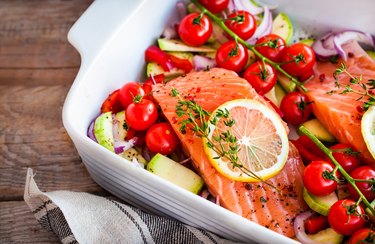
Many of us probably think that forgetfulness is a natural part of aging. But there's plenty of research to support that the way we eat may affect how sharp our brains stay as we get older. Enter the MIND diet, which may support brain health as you age. But what is the MIND diet, exactly?
This eating style is a combination of the Mediterranean and DASH diets, and emphasizes foods that support brain health. Evidence is piling up that the MIND diet can help lower your risk of cognitive decline and dementia, among other benefits (more on that later).
Here's everything you need to know about the diet, a sample meal plan and tips on how to adopt it.
What Is the MIND Diet?
The MIND diet is an acronym that stands for Mediterranean-DASH Intervention for Neurodegenerative Delay. As you might have guessed from its full name, the diet blends certain features of the popular Mediterranean and DASH diets, with the goal of keeping your brain in tip-top shape, per June 2015 research in Alzheimer's and Dementia.
The diet was developed in 2015 by researchers at Rush University Medical Center and the Harvard School of Public Health, who examined studies that linked specific foods to cognition and dementia. The result of their research is an eating plan that aims to slow the decline of brain health as we age and reduce the risk of Alzheimer's, according to the International Food Information Council Foundation.
"The MIND diet was designed to focus on nutrients that are specifically neuroprotective and emphasizes these nutrients more than the [Mediterranean and DASH] diets," Kaarin Anstey, senior principal research scientist at Neuroscience Research Australia, who studies cognitive aging and dementia, tells LIVESTRONG.com. In other words, the MIND diet fuses ingredients from both eating plans to optimize your diet for brain health.
The Mediterranean diet centers on fruits, vegetables, beans, legumes and whole grains, while limiting red meat, dairy, sweets and foods high in saturated fat, per the Cleveland Clinic. Followers eat fish two to three times per week and have poultry, nuts, seeds and wine in moderation. Olive oil, central to the eating style, is particularly rich in the monounsaturated fat that provides many of the heart-healthy benefits for which the diet is praised.
The MIND diet likewise encourages followers to eat fish (albeit slightly less, with one fish dish recommended per week), as long-term studies have linked this to a lower risk of dementia and cognitive decline, Anstey says. And instead of stressing all fruits and vegetables, the MIND diet hones in on berries and leafy greens specifically, because these foods have proven brain-supporting benefits.
The DASH diet — which stands for Dietary Approaches to Stop Hypertension — was originally developed to help people lower their blood pressure, according to the Cleveland Clinic. It takes a plant-focused approach similar to the Mediterranean diet and also discourages saturated fat, sugar and sodium while encouraging foods rich in protein, fiber and unsaturated fats.
Similarly, the MIND diet discourages dairy products like cheese and butter because of their saturated fat content. But in contrast to the DASH diet, foods containing dairy are not encouraged — even in their low- or no-fat versions — because there isn't enough known about their effects on brain health to either recommend or discourage them.
Benefits of the MIND Diet
This brain-healthy diet plan boasts a number of perks, including:
1. It Supports Brain Health
Long-term studies appear to back up the claim that the MIND diet protects cognitive function. The first study that suggested its effectiveness was the June 2015 research in Alzheimer's and Dementia. Researchers followed 960 older adults for nine years and found a striking effect: Those that followed the MIND diet functioned cognitively as though they were 7.5 years younger than those people who did not.
The findings held up even when researchers took into account how often participants worked out and their level of education (exercising and having a higher education level are both associated with a reduced risk of cognitive decline).
In September 2015, another study from the same research group, also in Alzheimer's and Dementia, showed that MIND diet followers had half the risk of developing Alzheimer's disease as their non-MIND-following counterparts. Even those who only partially followed the diet had a 35 percent lower chance of getting the disease. So in other words, even a little bit seems to do the brain good.
And a June 2019 review in Advances in Nutrition showed that while the DASH, Mediterranean and MIND diets all reduced the risk of cognitive decline, the MIND diet was most strongly linked to lowering that risk.
2. It Can Lead to Weight Loss
While this brain health diet plan isn't aimed at weight loss, it's possible you'll shed pounds. The eating style prioritizes high-fiber foods like fruits, vegetables and whole grains while also forgoing most saturated fats and added sugars, all of which may contribute to losing weight, according to the Baylor College of Medicine.
3. It's Flexible
Unlike other diet programs that require calorie counting, extensive meal planning or highly specific ingredients, this eating style incorporates widely available foods with no set rules. As a result, it's more easy to follow than most other programs, per the Mayo Clinic — you can customize the MIND diet guidelines to your lifestyle and preferences while still reaping all the benefits.
Tip
In general, the MIND diet is safe and sustainable for most people, per the Baylor College of Medicine. If you have an underlying condition that affects your diet, talk to your doctor or dietitian to tailor the eating plan to your needs.
Foods to Eat on the MIND Diet
The MIND diet includes plenty of brain-supporting ingredients: Specifically, 10 types of food that research has found to protect our brains from decline. Here are the foods to eat:
- Green leafy vegetables: Six or more servings per week
- Other vegetables: One or more servings per day
- Nuts: Five or more servings per week
- Berries: Two or more servings per week
- Beans: Three or more servings per week
- Whole grains: Three or more servings per day
- Fish: One or more servings per week
- Poultry: Two or more servings per week
- Olive oil: To be used as your primary oil
- Wine: No more than one glass per day
Foods to Avoid
At the same time, the MIND diet plan encourages limiting or avoiding these five types of food that might be detrimental to brain health:
- Red meat: No more than three servings per week
- Butter and margarine: Less than one tablespoon per day
- Cheese: Less than one serving per week
- Pastries and sweets: Less than five servings per week
- Fried or fast food: Less than one serving per week
A Sample MIND Diet Meal Plan
Ready to get started? Here's a 7-day MIND diet meal plan to kick it off:
Day 1
- Breakfast: Ginger-Berry Smoothie with 1/2 cup of cooked oatmeal
- Lunch: Bean and Farro Buddha Bowl with Cilantro-Apple Dressing
- Dinner: Quinoa "Taco" Bowl
Day 2
- Breakfast: Semi-Handmade Breakfast Veggie Burger
- Lunch: Nutty Zucchini Grain Salad
- Dinner: Grilled Sweet-n-Spice Salmon With Rice
Day 3
- Breakfast: Steel-Cut Oatmeal Berry Breakfast Bake
- Lunch: Salmon and Broccolette Superfood Salad
- Dinner: Veggie-Loaded Pasta
Day 4
- Breakfast: Middle Eastern Chicken Breakfast Superfood Bowl
- Lunch: Caesar-Style Kale Salad with whole-grain bread
- Dinner: Quinoa Stir-Fry
Day 5
- Breakfast: Oatmeal Smoothie with Whole Grain Waffles
- Lunch: Butternut Squash and Black Bean Chili
- Dinner: Pine Nut and Spinach Pasta
Day 6
- Breakfast: Green Toasts
- Lunch: Farro with Charred Vegetables
- Dinner: Spiced Hummus Flatbread "Pizza"
Day 7
- Breakfast: Super Green Smoothie with whole-wheat toast or English muffin
- Lunch: Spicy Rainbow Quinoa Buddha Bowl
- Dinner: Lentil Pasta With Creamy Red Pepper Sauce and Spinach
Tips for Getting Started

Gabrielle Vetere Davis, RDN, a certified obesity and weight management specialist in the Silicon Valley area, recommends getting used to the diet in a few steps.
1. Make healthy swaps. Davis suggests taking stock of what you're eating, and replace things like fast food with homemade meals.
2. Up your produce intake. Focus on vegetables, especially leafy greens like kale and spinach, as well as antioxidant-rich berries like strawberries and blueberries.
3. Tackle your proteins. "Aim to pick ones that are low in saturated fat, and add in some plant-based proteins," Davis says. Good examples include chicken, fish, beans and tofu. If you don't like fish or are allergic, try chia seeds, walnuts or even seaweed to get beneficial omega-3 fatty acids.
4. Replace your refined carbohydrates with whole grains. Trade rice for quinoa, sugary cereals for oatmeal or millet and white bread for whole-grain bread, Davis says.
5. Don't stress over "right" and "wrong" foods. "Guilt around eating can increase the risk of deprivation and restriction," Davis says. Instead of worrying about following the rules perfectly, just stick to the diet as best you can.
The Bottom Line
The MIND diet — which borrows from the Mediterranean and DASH diets — is an eating plan that research shows can help promote brain health throughout your life. The diet prioritizes brain-supporting ingredients like fruits and vegetables (particularly berries and leafy greens), whole grains, nuts, olive oil and lean sources of protein like poultry and fish, while minimizing saturated fats and added sugars.
The diet is safe, sustainable and easy to follow for most people given its flexibility and its use of widely available foods. Besides its brain health benefits, the diet may also contribute to weight loss for some.
Is this an emergency? If you are experiencing serious medical symptoms, please see the National Library of Medicine’s list of signs you need emergency medical attention or call 911.



